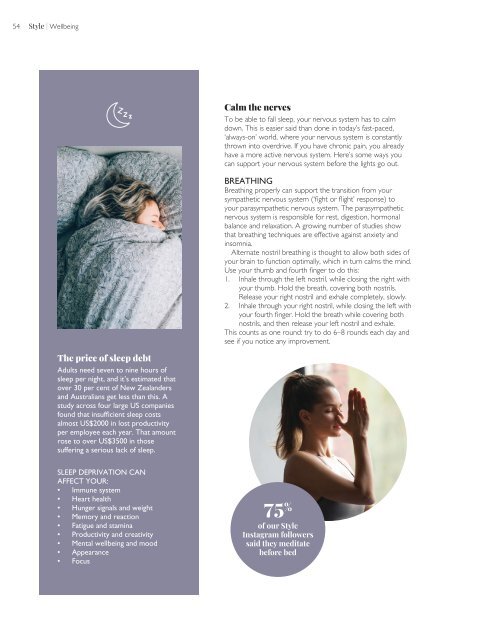Create successful ePaper yourself
Turn your PDF publications into a flip-book with our unique Google optimized e-Paper software.
54 <strong>Style</strong> | Wellbeing<br />
Calm the nerves<br />
To be able to fall sleep, your nervous system has to calm<br />
down. This is easier said than done in today’s fast-paced,<br />
‘always-on’ world, where your nervous system is constantly<br />
thrown into overdrive. If you have chronic pain, you already<br />
have a more active nervous system. Here’s some ways you<br />
can support your nervous system before the lights go out.<br />
BREATHING<br />
Breathing properly can support the transition from your<br />
sympathetic nervous system (‘fight or flight’ response) to<br />
your parasympathetic nervous system. The parasympathetic<br />
nervous system is responsible for rest, digestion, hormonal<br />
balance and relaxation. A growing number of studies show<br />
that breathing techniques are effective against anxiety and<br />
insomnia.<br />
Alternate nostril breathing is thought to allow both sides of<br />
your brain to function optimally, which in turn calms the mind.<br />
Use your thumb and fourth finger to do this:<br />
1. Inhale through the left nostril, while closing the right with<br />
your thumb. Hold the breath, covering both nostrils.<br />
Release your right nostril and exhale completely, slowly.<br />
2. Inhale through your right nostril, while closing the left with<br />
your fourth finger. Hold the breath while covering both<br />
nostrils, and then release your left nostril and exhale.<br />
This counts as one round: try to do 6–8 rounds each day and<br />
see if you notice any improvement.<br />
The price of sleep debt<br />
Adults need seven to nine hours of<br />
sleep per night, and it’s estimated that<br />
over 30 per cent of New Zealanders<br />
and Australians get less than this. A<br />
study across four large US companies<br />
found that insufficient sleep costs<br />
almost US$2000 in lost productivity<br />
per employee each year. That amount<br />
rose to over US$3500 in those<br />
suffering a serious lack of sleep.<br />
SLEEP DEPRIVATION CAN<br />
AFFECT YOUR:<br />
• Immune system<br />
• Heart health<br />
• Hunger signals and weight<br />
• Memory and reaction<br />
• Fatigue and stamina<br />
• Productivity and creativity<br />
• Mental wellbeing and mood<br />
• Appearance<br />
• Focus<br />
75 %<br />
of our <strong>Style</strong><br />
Instagram followers<br />
said they meditate<br />
before bed


















